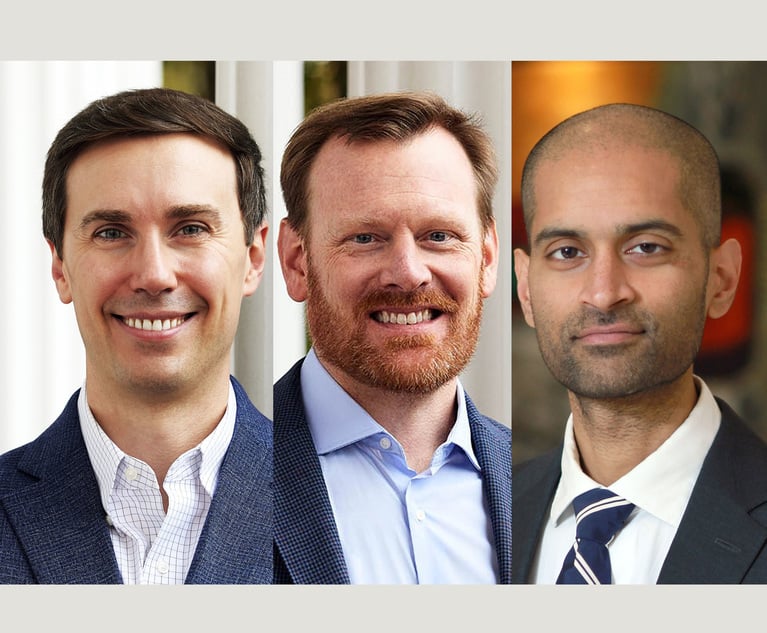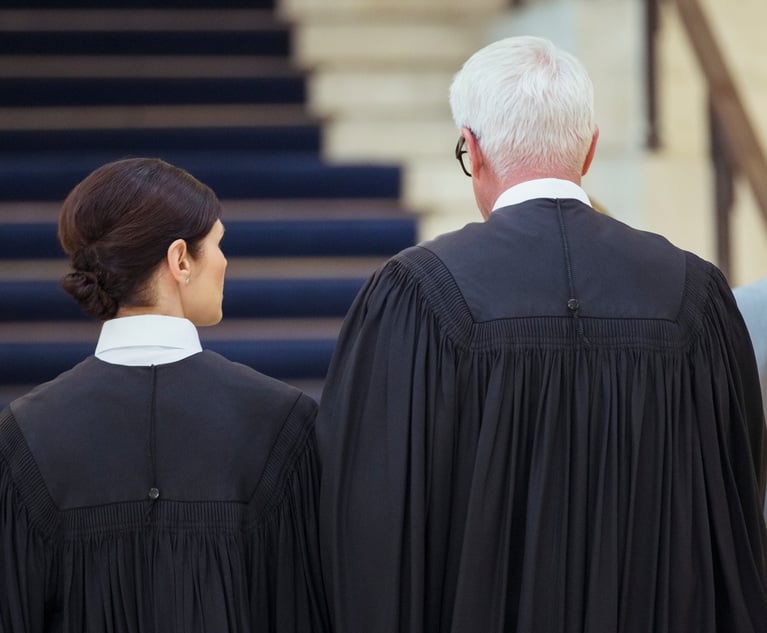Atlanta Legal Aid Wins National Grant to Boost Online Services
A new technology grant from the Legal Services Corporation is part of national initiative to make it easier for those seeking legal assistance to find it online.
November 15, 2017 at 12:37 PM
6 minute read
 Atlanta Legal Aid Society (Photo: John Disney/ ALM)
Atlanta Legal Aid Society (Photo: John Disney/ ALM)
The Atlanta Legal Aid Society has landed a major grant from the Legal Services Corp. to both overhaul the state's self-help legal aid website and make it a national model for accessibility to people with disabilities.
The $134,720 grant to update GeorgiaLegalAid.org is one of 25 Technology Initiative Grants the federal legal aid funder awarded this year as part of a national initiative to make it easier for those seeking legal assistance to find it online.
“The grants make legal information, court forms, video instruction, and practical tips available to people who otherwise would have to navigate the legal system without any help,” said LSC president Jim Sandman in a statement.
Atlanta Legal Aid jointly maintains GeorgiaLegalAid.org with the Georgia Legal Services Program. Launched in 2004, it is a robust source of self-help legal information, but “it needs a facelift,” said Kristin Verrill, Atlanta Legal Aid's director of grants and innovation. Like many legal aid websites nationally, it needs an organizational and design overhaul as well as an update to its content, she said.
The 27-month grant will fund a paralegal to revamp the content and an accessibility expert to make it user-friendly to those with sight, hearing or other impairments and the adaptive technologies they use, Verrill said.
The retooled and disability-accessible GeorgiaLegalAid.org website will be used as a template for LawHelp.org, a national legal aid website developed and maintained by Pro Bono Net, in partnership with hundreds of legal services nonprofits, Verrill said, adding that Pro Bono Net provides tech support for legal services groups' self-help websites around the country.
“That way, other programs can take advantage of what we do to update the Georgia website,” said Atlanta Legal Aid's executive director, Steve Gottlieb.
Another Atlanta Legal Aid website, OlmsteadRights.org, started by the group's groundbreaking Disability Integration Project, will serve as the model for making GeorgiaLegalAid.org accessible to those with disabilities.
Talley Wells, the project's head (until Nov. 30 when he becomes executive director of Georgia Appleseed), brought in a disability consultant to make OlmsteadRights.org similarly user-friendly.
“We're excited because the LSC through this grant is supporting us to leverage the lessons we learned to make the GeorgiaLegalAid.org and LawHelp.org websites as accessible as possible,” Wells said, adding that between 8,000 and 9,000 people per month nationally use the OlmsteadRights.org website.
“While Georgia Legal Services and Atlanta Legal Aid represent thousands of Georgians, there are thousands of other Georgians we are not able to represent who need legal services—so we are using technology and other resources so we can get them some equipment to face whatever civil legal challenges they may have,” Well said.
“We provide self-help—an essential tool not just for litigants but for the courts. We want to make sure our tech matches our content,” Wells said.
 Atlanta Legal Aid Society (Photo: John Disney/ ALM)
Atlanta Legal Aid Society (Photo: John Disney/ ALM)
The Atlanta Legal Aid Society has landed a major grant from the Legal Services Corp. to both overhaul the state's self-help legal aid website and make it a national model for accessibility to people with disabilities.
The $134,720 grant to update GeorgiaLegalAid.org is one of 25 Technology Initiative Grants the federal legal aid funder awarded this year as part of a national initiative to make it easier for those seeking legal assistance to find it online.
“The grants make legal information, court forms, video instruction, and practical tips available to people who otherwise would have to navigate the legal system without any help,” said LSC president Jim Sandman in a statement.
Atlanta Legal Aid jointly maintains GeorgiaLegalAid.org with the
The 27-month grant will fund a paralegal to revamp the content and an accessibility expert to make it user-friendly to those with sight, hearing or other impairments and the adaptive technologies they use, Verrill said.
The retooled and disability-accessible GeorgiaLegalAid.org website will be used as a template for LawHelp.org, a national legal aid website developed and maintained by Pro Bono Net, in partnership with hundreds of legal services nonprofits, Verrill said, adding that Pro Bono Net provides tech support for legal services groups' self-help websites around the country.
“That way, other programs can take advantage of what we do to update the Georgia website,” said Atlanta Legal Aid's executive director, Steve Gottlieb.
Another Atlanta Legal Aid website, OlmsteadRights.org, started by the group's groundbreaking Disability Integration Project, will serve as the model for making GeorgiaLegalAid.org accessible to those with disabilities.
Talley Wells, the project's head (until Nov. 30 when he becomes executive director of Georgia Appleseed), brought in a disability consultant to make OlmsteadRights.org similarly user-friendly.
“We're excited because the LSC through this grant is supporting us to leverage the lessons we learned to make the GeorgiaLegalAid.org and LawHelp.org websites as accessible as possible,” Wells said, adding that between 8,000 and 9,000 people per month nationally use the OlmsteadRights.org website.
“While
“We provide self-help—an essential tool not just for litigants but for the courts. We want to make sure our tech matches our content,” Wells said.
This content has been archived. It is available through our partners, LexisNexis® and Bloomberg Law.
To view this content, please continue to their sites.
Not a Lexis Subscriber?
Subscribe Now
Not a Bloomberg Law Subscriber?
Subscribe Now
NOT FOR REPRINT
© 2025 ALM Global, LLC, All Rights Reserved. Request academic re-use from www.copyright.com. All other uses, submit a request to [email protected]. For more information visit Asset & Logo Licensing.
You Might Like
View All

Spalding Jurors Return $12M Verdict Against State Farm Insurance Client
10 minute read

Trending Stories
- 1Here's What Corporate Litigators Expect Delaware Courts to Address in 2025
- 2Adapting to AI and the Needs of Lawyers Will Be Key For Shutts & Bowen, Says Incoming Ft. Lauderdale Leader
- 3What Qualities Will Distinguish Good from Great Service In 2025?
- 4The Met Hires GC of Elite University as Next Legal Chief
- 5Not Here: Court Finds Texas Has No Jurisdiction Over Google
Who Got The Work
Michael G. Bongiorno, Andrew Scott Dulberg and Elizabeth E. Driscoll from Wilmer Cutler Pickering Hale and Dorr have stepped in to represent Symbotic Inc., an A.I.-enabled technology platform that focuses on increasing supply chain efficiency, and other defendants in a pending shareholder derivative lawsuit. The case, filed Oct. 2 in Massachusetts District Court by the Brown Law Firm on behalf of Stephen Austen, accuses certain officers and directors of misleading investors in regard to Symbotic's potential for margin growth by failing to disclose that the company was not equipped to timely deploy its systems or manage expenses through project delays. The case, assigned to U.S. District Judge Nathaniel M. Gorton, is 1:24-cv-12522, Austen v. Cohen et al.
Who Got The Work
Edmund Polubinski and Marie Killmond of Davis Polk & Wardwell have entered appearances for data platform software development company MongoDB and other defendants in a pending shareholder derivative lawsuit. The action, filed Oct. 7 in New York Southern District Court by the Brown Law Firm, accuses the company's directors and/or officers of falsely expressing confidence in the company’s restructuring of its sales incentive plan and downplaying the severity of decreases in its upfront commitments. The case is 1:24-cv-07594, Roy v. Ittycheria et al.
Who Got The Work
Amy O. Bruchs and Kurt F. Ellison of Michael Best & Friedrich have entered appearances for Epic Systems Corp. in a pending employment discrimination lawsuit. The suit was filed Sept. 7 in Wisconsin Western District Court by Levine Eisberner LLC and Siri & Glimstad on behalf of a project manager who claims that he was wrongfully terminated after applying for a religious exemption to the defendant's COVID-19 vaccine mandate. The case, assigned to U.S. Magistrate Judge Anita Marie Boor, is 3:24-cv-00630, Secker, Nathan v. Epic Systems Corporation.
Who Got The Work
David X. Sullivan, Thomas J. Finn and Gregory A. Hall from McCarter & English have entered appearances for Sunrun Installation Services in a pending civil rights lawsuit. The complaint was filed Sept. 4 in Connecticut District Court by attorney Robert M. Berke on behalf of former employee George Edward Steins, who was arrested and charged with employing an unregistered home improvement salesperson. The complaint alleges that had Sunrun informed the Connecticut Department of Consumer Protection that the plaintiff's employment had ended in 2017 and that he no longer held Sunrun's home improvement contractor license, he would not have been hit with charges, which were dismissed in May 2024. The case, assigned to U.S. District Judge Jeffrey A. Meyer, is 3:24-cv-01423, Steins v. Sunrun, Inc. et al.
Who Got The Work
Greenberg Traurig shareholder Joshua L. Raskin has entered an appearance for boohoo.com UK Ltd. in a pending patent infringement lawsuit. The suit, filed Sept. 3 in Texas Eastern District Court by Rozier Hardt McDonough on behalf of Alto Dynamics, asserts five patents related to an online shopping platform. The case, assigned to U.S. District Judge Rodney Gilstrap, is 2:24-cv-00719, Alto Dynamics, LLC v. boohoo.com UK Limited.
Featured Firms
Law Offices of Gary Martin Hays & Associates, P.C.
(470) 294-1674
Law Offices of Mark E. Salomone
(857) 444-6468
Smith & Hassler
(713) 739-1250






